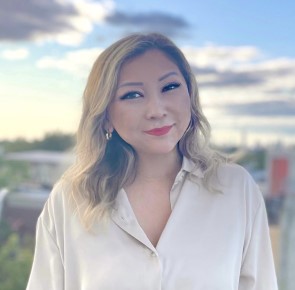
“European Jewish Refugees in the Soviet Union During the Holocaust”
Professional Background
Laura Auketayeva (she/her) is currently PhD Candidate in the Department of History at American University, Washington, D.C. She received her BA in International Relations and History from Boston University, as well as MA in History from the State University of New York, Albany.
Laura had served as a doctoral intern at the National Museum of Jewish History where she created and presented a museum exhibit model titled Jewish Woman Scientists and the Manhattan Project. At the Herbert Katz Center for Advanced Judaic Studies, she assisted in the effort to create the collection that consists of over 100 boxes of archival material written by and about B.Z. Goldberg, an American Yiddish journalist and historian, and son-in-law of Sholom Aleichem. Laura published several articles, including “A Curious History of Two Banned Soviet Jewish Poems,” “Some Things about Joseph Eyer” and finding aids about the Soviet archival collections at the Kislak Center for Special Collections, Rare Books, and Manuscripts at University of Pennsylvania.
As an award winner of the Eunice Sherer Studies Fellowship and the Dr. Dorothy and Victor Gondos Jr. Scholarship, Laura conducted research at the YIVO Institute in New York and completed the Uriel Weinreich Summer Program in Yiddish Language, Literature, and Culture there. She presented her research articles titled “Jewish Youth and the Soviet Union, 1941-45” and “Refuseniks: Jewish Identity and Gender” at the Association of Jewish Studies Conference, Northeastern University Graduate Conference, and Lessons and Legacies Holocaust Conference (2020 and 2018). Following her work with the Soviet maps for Dr Alexis Peri’s The War Within, Laura joined the ongoing seminar by the Holocaust Geographies Virtual Seminar, which utilizes mapping to examine spaces and places of the Holocaust.
Fellowship Research
During her fellowship, Laura’s study will seek to answer the following questions: What was the role of gender in everyday life for Eastern and Central European Jews who fled or were evacuated to the interior of the Soviet Union? How did gender role expectations affect their recounting of the past? What can their silences about sexual encounters reveal? What role did age play in their experiences at the time? How did antisemitism and state rules and restrictions affect their mobility?
She argues that we cannot understand the time individuals spent in the Soviet Union without looking through the lens of gender, especially because their experiences and the way they discussed such experiences were deeply gendered. Another important aspect of her work includes social network analysis, which tackles the cultural and local dimensions of this transnational story. In addition, geography plays an important part in this study; besides providing the context for movement and isolation, it also gives insight into the background, including places that were both physical and imagined. Her dissertation uses gender as the main analytical lens to understand experiences the way Eastern and Central European Jews recounted their years during and after the war. Laura will make use of interviews, letters, and memoirs, many of which are a part of the Museum’s The Jeff and Toby Herr Oral History Archive. There are likewise two types of primary sources at the Museum she will mainly focus on: testimonies and memoirs by Jewish refugees, and the Soviet records from the Soviet Central Asian republics they were sent to. Despite the rising number of monographs on Jews and the Soviet Union, the topic of Jewish refugees in the USSR requires further research. Her study hopes to be a small part of that effort.
